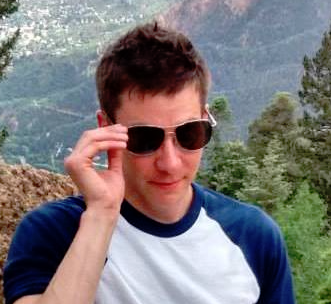You became “her rock” and it felt right even though you had secretly wanted more since you first got to know her. She had told you she could only offer you friendship the night before you left for boot camp in February, and somehow at the time that was enough. But you didn’t let her use that as an excuse to treat you badly like other boys. You held her up to the standards that the Marine Corps had held you to by not allowing her to mistake your kindness for a weakness. You were not some college boy she could write off when she wanted. You risked losing her friendship multiple times by standing up to her behavior, but you did so with the willingness to lose what you wanted most. When she told you she wanted to make it official while you were in Kuwait, she defined what it meant for you to be able to do anything.
Your stomach will be in knots. The phone call has been on your mind since you first received the email the night before. You’ll know what “we need to talk” in her email means. It’s what you were trained to do––to act deliberately and effectively. You hated putting things off, if there were any fires back home, you were swift to deal with them. Thankfully, it was faster than snail mail, which would take weeks to arrive.
Throughout the deployment you looked forward to mail call. Mail came sporadically every two weeks, offering something new to a life that existed around routine. Letters traveled through the walls of Camp Fallujah and was evidence that your life still existed. Something you could smell on the perfume she sprayed on her letters and the pictures she would send that you could hold in your hands.
You worked thirteen to fourteen hour shifts seven days a week, the closest thing to a nine to five you could get in Iraq on your first deployment. The stable schedule meant the time you weren’t sleeping, working, or at P.T. (physical training), you would spend writing or trying to call her. You had hand written each other letters at least once a week since you arrived in Camp Fallujah––sometimes three if the week was bad. What you were going through, where you wanted to be, hidden secrets about your pasts, and promises of when you could be together again. When you received the letters the day was special. When you got packages from her—Christmas. You couldn’t open packages until you left your workplace in the Tactical Fusion Center. They sat there throughout the day, as testimony that you could go the distance. You could accomplish anything.
Sergeant D’s wife filed for divorce. Garrett’s girlfriend had been with a guy that was HIV positive while he worked beside you––but she wanted to patch things up. Then there were the two Marines sitting on the bench outside of the phone center, you only caught “she fucked my best friend,” from their conversation. You kept walking. There was nothing they could do. There was no moving on in the sandbox.
You’ll pick up the phone and shakily dial the phone sequence you have committed to memory. First you’ll dial the number to the phone center, then your phone card’s twenty-digit code, then one, and then her number. She has never said we need to talk before. There was only one email prior to the last where she had mentioned anything about feeling alone. You figured she was having one of her emotional moments. She missed you. But that was before you read we need to talk. You tap the buttons as rapidly as the phone system will allow you to, and you listen to the rings as the signal connects from Camp Fallujah, Iraq to her cell phone in East Lansing, Michigan.
You will keep the phone conversation under five minutes. She will not see you weak. You will say you understand as she erupts. You won’t understand. You’ll afford her the space to express and do what she wants like you always have. You won’t try to convince her to change her mind. You’ll already know you’ve done everything possible to be there. You will sit tall and keep your composure, but you’ll say the final words quietly in hopes that no one sees your defeat––your tarnished pride. You’ll settle on the words, “I wish you the happiness in life that I couldn’t give you.” Then you’ll stand up from the table, chest out and head high with your rifle hanging around your neck. You’ll be more in love with the idea of saving face than saving your relationship.
 John Soltysiak is a lover of stories with unexpected endings. He received his bachelor’s degree from Michigan State University in professional writing. A marine, John spent most of his enlistment overseas in Southeast Asia and Iraq. When he’s not busy drinking coffee and writing, John likes to run and spend time traveling to Chicago for the weekend.
John Soltysiak is a lover of stories with unexpected endings. He received his bachelor’s degree from Michigan State University in professional writing. A marine, John spent most of his enlistment overseas in Southeast Asia and Iraq. When he’s not busy drinking coffee and writing, John likes to run and spend time traveling to Chicago for the weekend.